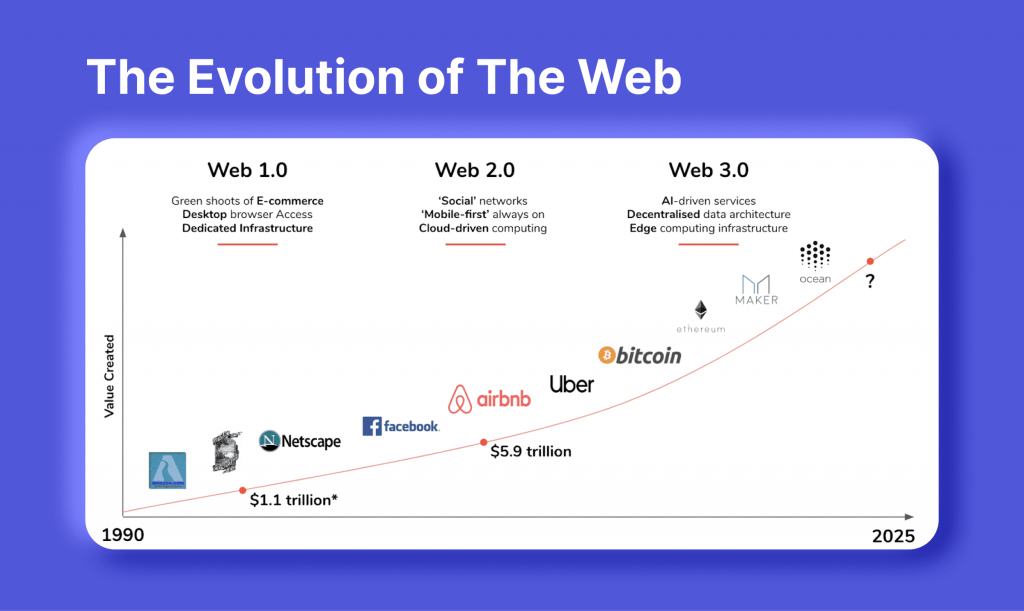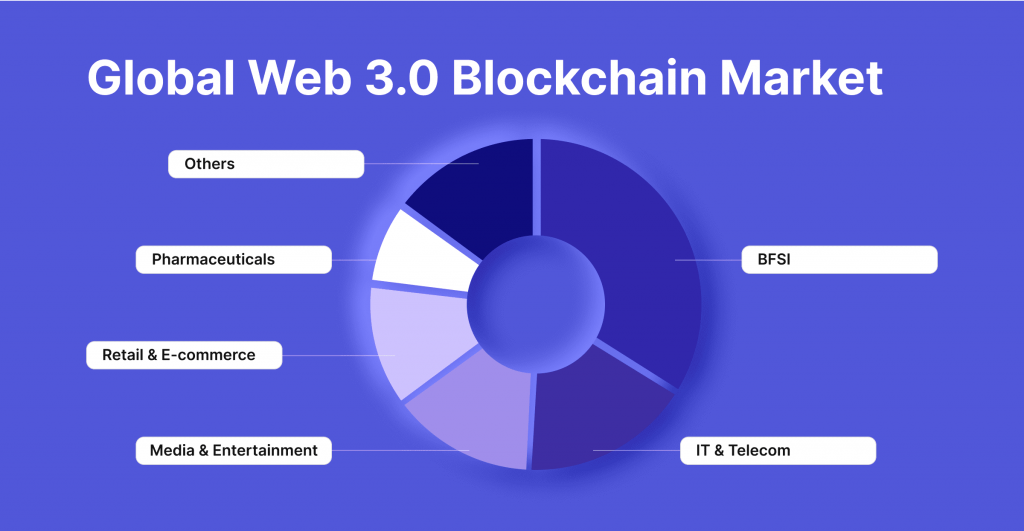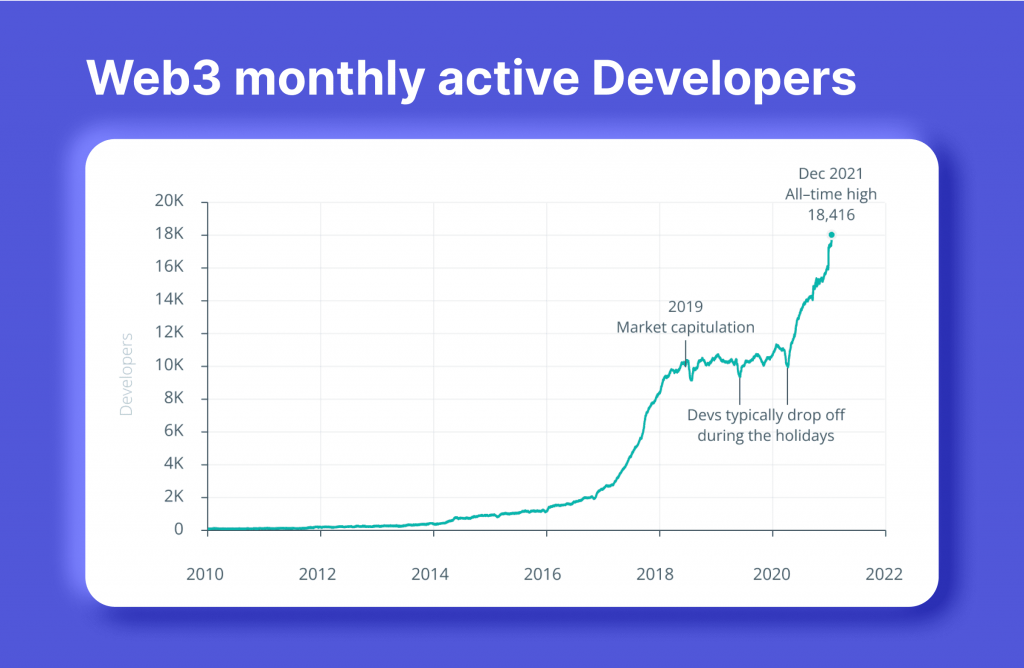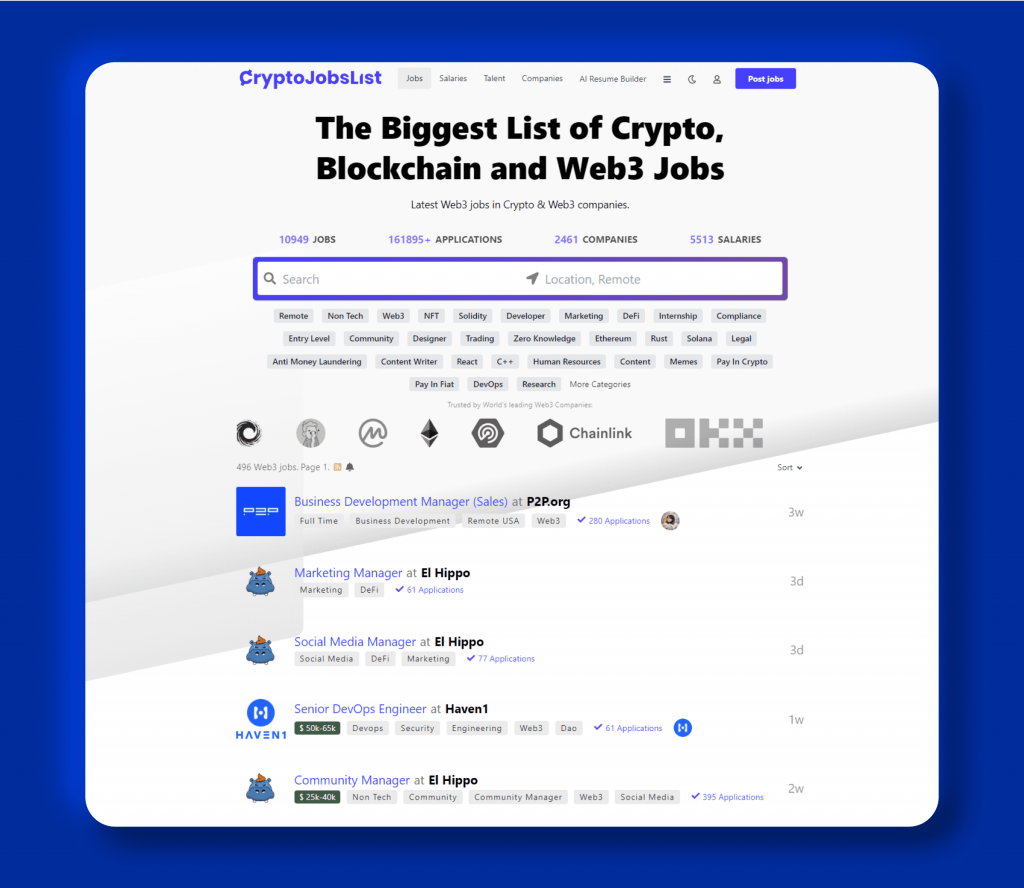The Most In-Demand Web3 Jobs: What To Expect in 2024 and Beyond?
The Internet has undergone significant transformations since its early days. Web 1.0 provided a static experience, limiting access to content-rich websites. Then Web 2.0 arrived, introducing dynamic websites and social media; however, this came at the cost of centralisation.
Web3 is looking to change all that and give us greater control over our digital information, as well as create a semantic web where machines can easily understand and process user-generated content. This is a huge step forward in the development of the Internet, and it’s only natural that an increasing number of businesses are looking to capitalise on this emerging technology.

But what does this mean for professionals who wish to pursue a career in Web3? In this article, we will discuss the most in-demand Web3 jobs in 2023, the trends that will shape the job market for this industry, and how one can prepare for a career in Web3.
Key Takeaways:
- Web3 is the next iteration of the Internet, which will give us greater control over our digital information and create a decentralised system that allows anyone to participate freely in the Web3 ecosystem.
- Web3 job opportunities are diverse and wide-ranging, spanning from front-end developers to data scientists and compliance professionals, all of whom play an important role in driving innovation and helping projects succeed.
- The main Web3 trends include increasing interest in decentralised finance (DeFi), heightened focus on security, DeFi risk insurance, user-friendly DeFi apps, and others.
- Staying up-to-date with the industry and building a standout portfolio is essential for success in Web3.
Why Web3 Is the Future of the Internet?
The concept of Web3, often referred to as the new and improved Internet, has gained traction among many enthusiasts. With its primary objective of restoring ownership authority to consumers, Web3 leverages various technologies such as blockchains, cloud computing, digital assets, and NFTs.
Fast Fact:
- The term “Web3” was created by computer scientist Gavin Wood, an Ethereum co-founder, in 2014.
In a nutshell, Web1 was a one-way street, allowing people to access information but not interact with it. Web2 stepped it up by allowing people to both view and contribute content. With Web 3.0, people can not only view and use content but also own it – including the ability to monetise their creations. This marks a major shift in how Internet technology is used and opens up many possibilities for creators.
What Are Web3’s Ideas?
Web3 embraces the principles of decentralisation, autonomy, native payments, and trustlessness at its core. This revolutionary paradigm shift in technology ensures that ownership of Web3 is not limited to a select few but rather shared among both creators and consumers. It promotes inclusivity and democratises access, allowing anyone who wishes to participate to freely engage with the Web3 ecosystem.

Furthermore, Web3 goes beyond traditional banking methods for online purchases and payments. It introduces cryptocurrencies with economic principles as the means to facilitate transactions. By leveraging the power of blockchain technology, Web3 provides a secure and transparent environment, offering greater autonomy and control over one’s financial interactions.
How Will It Impact the Future Business Landscape?
With its emphasis on shared ownership, accessibility, and innovative financial mechanisms, Web3 is poised to reshape the digital landscape and empower individuals in unprecedented ways.
The implications of this cannot be understated; it will open up new opportunities for users and businesses alike. This could lead to drastic improvements in areas such as data sovereignty, privacy, business models, and many more. All of which are expected to drive the demand for Web3 professionals in the coming years.

Web3 Job Opportunities
Within the realm of Web3, a vast and ever-expanding array of job opportunities awaits. From blockchain developers and smart contract auditors to decentralised application designers and digital identity specialists, there is a role tailored to your unique skills and experience within this burgeoning movement. Let’s take a look at some of the most in-demand Web3 jobs in 2023 and beyond:
Blockchain Developers
As the cornerstone technology behind Web3, blockchain is seeing increasing demand for qualified professionals who can develop and maintain distributed ledger systems. With large-scale enterprises from a myriad of sectors beginning to explore the potential benefits of blockchain, this role is expected to remain in high demand.
Cryptography & Security Experts
The security of blockchain networks is of utmost importance in the success of Web3. With the increasing reliance on decentralised applications, the need for expertise in cryptography and security is critical. The role of professionals in this field is to ensure that Web3-powered applications remain uncompromised, safeguarding sensitive data and maintaining the trust of users. By employing robust security measures and staying ahead of potential threats, these experts contribute to the seamless functioning and widespread adoption of Web3 technology.
Front-end Developers
Front-end developers play a crucial role in creating and building interfaces of applications that users interact with. In the realm of blockchain technology, it is essential to prioritise a user-friendly experience and simplify the complexities involved. Intuitive UX design is key, as it helps newcomers navigate the world of Web3 seamlessly. Mobile applications with smooth interfaces have been instrumental in attracting and onboarding thousands of users to Web3, underscoring their significance.
As Web3 continues to mature, the demand for talented front-end developers will only continue to grow. With their expertise in HTML, CSS, JavaScript, React, Vue, and other contemporary frameworks, these professionals ensure that web3-powered applications boast a smooth user experience.

Backend Developers
Backend developers play a critical role in building the foundation of Web3 applications. They are experts in blockchain frameworks, protocols, networks, and distributed ledger technology. With their technical expertise, they create dynamic and secure applications in the ever-evolving Web3 landscape. Their contributions drive innovation and shape the future of decentralised systems.
Given the complexity of these tasks, backend developers need to stay up-to-date with emerging technologies such as smart contracts, decentralised storage, distributed computing, and more.
Smart Contract Developers
Smart contracts are self-executing computer programs used in Web3. As this technology is still relatively new, the demand for experienced, smart contract developers is high. The role of a smart contract developer includes writing and testing code, designing secure protocols, interfacing with blockchain networks, and monitoring deployed contracts.
Marketers
With the rise of Web3 technology, Web3 marketing jobs will occupy an increasingly important position as a means of spreading awareness about its potential and educating users on its capabilities. Since blockchain is a rapidly evolving field, marketers must possess a deep understanding of its concepts and principles. Their campaigns should aim to effectively promote Web3 applications and services while encouraging widespread adoption of this transformative technology.
Content Creators
Web3’s success relies heavily on vibrant and supportive communities. At the forefront of this movement are community managers who excel at fostering engagement, providing robust support, and driving widespread adoption. Armed with extensive knowledge about blockchain technology and its applications, they expertly address user queries and concerns. By facilitating conversations across various platforms such as forums, social media, Slack, and even Web3 conferences, they play a pivotal role in positioning Web3-powered projects for resounding success.
Community Managers
Web3’s success relies heavily on vibrant and supportive communities. At the forefront of this movement are community managers who excel at fostering engagement, providing robust support, and driving widespread adoption. Armed with extensive knowledge about blockchain technology and its applications, they expertly address user queries and concerns. By facilitating conversations across various platforms such as forums, social media, and Slack, they play a pivotal role in positioning Web3-powered projects for resounding success.
Data Scientists
Data science is an exciting and multidisciplinary field that combines statistics, programming, and machine learning. In the world of Web3, data scientists play a crucial role in harnessing insights from data to drive decision-making in the dynamic landscape. Through analysing and visualising vast amounts of data from blockchain networks, these experts uncover valuable trends and information that shape the development of applications and services, ultimately contributing to their success.
Consultants
In the rapidly evolving Web3 landscape, organisations are actively seeking seasoned professionals to offer personalised guidance for their blockchain-powered initiatives. Consultants play a crucial role in helping clients navigate the intricate realm of decentralised systems. By sharing their knowledge and expertise, they empower businesses to develop strategies that leverage the potential of Web3 while mitigating risks. As a result, web3 sales jobs and consultant positions, as well as web3 finance jobs, are becoming more and more sought-after.
Main Web3 Trends
As Web3 continues to gain traction, several key trends are emerging. Some of these include:
Growing interest in decentralised finance (DeFi)
DeFi has experienced a remarkable surge in popularity as a compelling alternative to conventional financial services. Harnessing the potential of blockchain technology, it empowers individuals to access loans, stablecoins, and an array of financial products, all without relying on intermediaries. As was evident from the recent collapse of the FTX exchange, centralised projects remain vulnerable to hacking, mismanagement, and other risks, which pinpoint the importance of decentralised alternatives.
Increased focus on security
As Web3 applications gain popularity, businesses are prioritising the implementation of strong security measures to safeguard user data from potential threats. These measures encompass advanced cryptography, encryption techniques, and secure protocols that guarantee user privacy and enhance overall safety.
DeFi risk insurance
With the rise in popularity of DeFi and cryptocurrency exchanges, companies are introducing groundbreaking insurance solutions to safeguard users against potential losses. These innovative policies offer coverage for risks like fund theft and smart contract vulnerabilities.
User-friendly DeFi apps
To encourage the widespread adoption of Web3 applications, businesses are investing in user-friendly platforms that make interacting with blockchain technology a seamless and enjoyable experience. This includes intuitive interfaces, simplified onboarding processes, and other features designed to ensure an optimal user experience.
Multi-chain interoperability
With the rise of different blockchain networks, the need for interoperability is becoming increasingly important. Companies are now developing protocols that enable users to effortlessly interact with multiple chains, allowing them to access the full potential of Web3.
Utility in Non-Fungible Tokens (NFTs)
As the popularity of NFTs continues to skyrocket, companies are exploring ways to create utility beyond trading and collecting. NFTs can be used to tokenize physical assets like homes and cars.
ReFi
ReFi, short for regenerative financing, is an innovative outcome of greener Web3 initiatives. This groundbreaking concept explores the utilisation of blockchain software development services to combat climate change and promote the conservation of energy resources, paving the way for a brighter and more sustainable future.
Social networks powered by Web3
In the current digital landscape, popular social networking platforms such as Instagram, TikTok, Facebook, and Twitter are all under the control of centralised entities. However, the emergence of Web3 social media provides an alternative paradigm where users can genuinely own and exercise control over their own data.
These emerging trends are indicative of the growing desire for Web3 applications and services, foreshadowing an exhilarating future for blockchain technology. As Web3 matures in the forthcoming years, it is certain to catalyse a paradigm shift across diverse industries on a global scale.
Preparing for a Career in Web3
With its immense potential and rising popularity, there’s no denying that Web3 opens up exciting avenues for professional advancement. However, the field is fiercely competitive and demands extensive expertise and skills to truly thrive.
Therefore, those aiming for success in this sector should possess comprehensive knowledge in various areas, including blockchain technology, cryptography, economics, and game theory, as well as proficiency in coding languages such as JavaScript, Python, and Solidity. Additionally, a strong grasp of fundamental concepts like consensus mechanisms, smart contracts, and distributed ledger technology is crucial for candidates.
In addition, keeping pace with the ever-evolving industry trends and advancements is crucial. Stay in the loop by participating in web3 events, joining web3 job Reddit or Discord communities, and staying updated with blockchain technology-related blogs.
Having a standout portfolio that showcases your expertise and experience in the field is crucial. This can encompass open-source initiatives, hackathon ventures, or even your very own blockchain-powered product or service.
Where Can I Find Work in Web3?
For those seeking a career in Web3, there are plenty of opportunities available. Companies are always in search of qualified professionals to aid them in their journey into the world of blockchain and decentralised systems:
- When it comes to job hunting, the conventional approach involves exploring platforms like LinkedIn and Indeed.com. However, don’t overlook the websites of prominent crypto organisations. Even in bear markets, numerous exchanges, wallet providers, metaverse companies, and DeFi services are actively seeking new talent.
- Get involved in Discord communities, dive into the code, share suggestions, interact with the team, and offer your valuable help. Being an active participant in the community is a great way to increase your visibility and get noticed.
- Join Web3-Focused job boards such as CryptoJobsList or Blocktribe forums to explore the latest openings.

Conclusion
The emergence of Web3 technologies is making a significant impact on the job market, providing an opportunity to work from virtually anywhere in the world. Although individuals may need to upskill and upgrade their skill set to transition into a new field, they should remain open-minded and creative in showcasing what sets them apart.
Now is the perfect time for budding professionals to enter Web3 as the demand for experienced personnel currently outweighs the supply, making it easier to break into the industry. Those who seize this chance can make a name for themselves within the sector and become successful in their chosen profession.
FAQs:
How is working in Web3 different from traditional web development roles?
Working in Web3 differs from traditional web development as it emphasises decentralised technologies. This requires proficiency in distributed ledgers, blockchain infrastructure, and smart contract programming languages, which are not typically required in web development roles. The aim is to create applications that operate without a central authority or server-level control, granting users more autonomy and security.
Are there any specific qualifications I need to have to work in Web3?
Most Web3 jobs require a deep understanding of blockchain technology and related programming languages. Having a degree in computer science or software engineering is recommended, though not always necessary. You will also need to have experience with web development processes such as coding, debugging, and testing. Additionally, familiarity with decentralised storage systems and cryptographic protocols is beneficial for this field.
However, there are many other roles within the Web3 space that don’t require such technical knowledge. For example, there are positions for product and project managers, consultants, marketing and content writers, designers, and legal advisors.
What kind of salaries can I expect in the Web3 industry?
According to CryptoJobsList, the average Web3 developer salary globally is around $128,073 per year. This is significantly higher than the average salary for a typical web developer. However, salaries in this field can also vary widely depending on experience level and location.
Are there any tools or technologies I should be familiar with to work in the Web3 sector?
Yes, there are a few common tools and technologies used in the Web3 sector. Ethereum is the most popular blockchain platform for developing Web3 applications. Popular programming languages include Solidity, Vyper, and JavaScript. Additionally, developers should be familiar with distributed storage solutions like IPFS and Swarm, as well as cryptographic protocols such as Elliptic Curve Cryptography (ECC). Finally, knowledge of web development frameworks such as React and Angular is beneficial.



